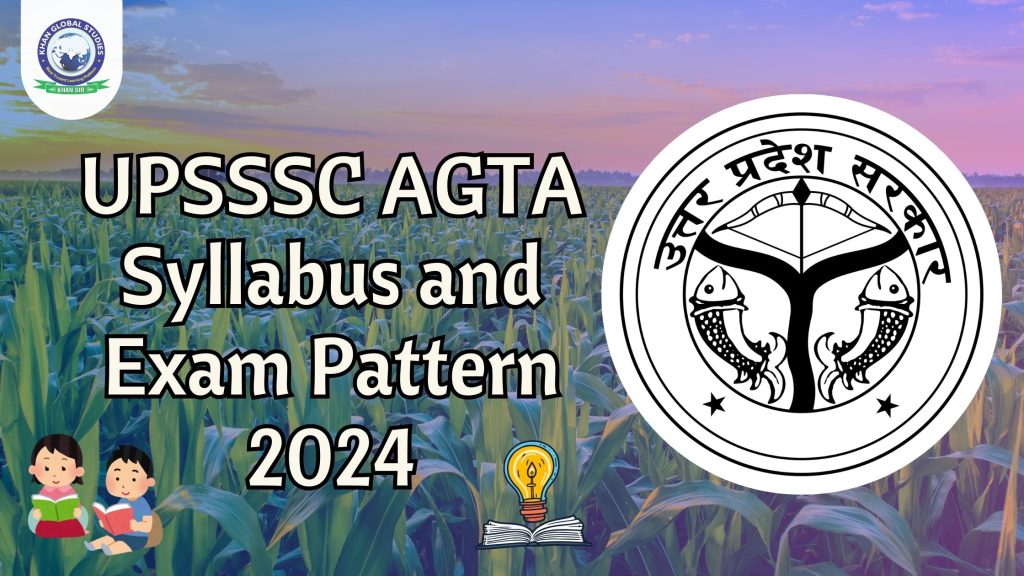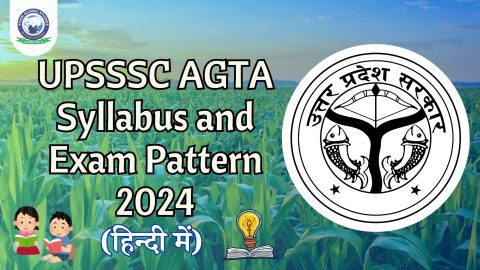Uttar Pradesh Subordinate Services Selection Commission (UPSSSC) has officially announced the UPSSSC AGTA Syllabus 2024 and Exam Pattern through its notification PDF available at www.upsssc.gov.in. Candidates eligible for Agricultural Technical Assistant (Pravidhi Sahayak) Group-C vacancies are advised to follow the syllabus closely to start their exam preparation. Keeping the UPSSSC AGTA Syllabus PDF accessible during your studies can be very helpful in creating a strategic approach to the exam, helping you to succeed with confidence. In this article, we provide a detailed overview of the UPSSSC Agricultural Technical Assistant Syllabus and Exam Pattern.
UPSSSC AGTA Syllabus 2024 Overview
Prospective candidates must delve into the comprehensive syllabus provided to cover all the required topics and understand their respective weightage. Mastering the syllabus and exam pattern is important to develop a strong study strategy. In this section, we will break down the topic of the UPSSSC AGTA exam 2024 to aid you in your exam preparation.
| Conducting Body | Uttar Pradesh Subordinate Services Selection Commission (UPSSSC) |
| Post Name | Agriculture Technical Assistant (AGTA), Group C |
| Exam Name | UPSSSC AGTA Exam 2024 |
| Mode of Exam | Online |
| No. of Questions | 100 |
| Maximum Marks | 100 |
| Negative Marking | 0.25 Mark |
| Time Duration | 120 Minutes |
| Selection Process | Written Exam and Document Verification |
| Official Website | https://www.upsssc.gov.in/ |
UPSSSC Agriculture Technical Assistant Syllabus 2024
The Uttar Pradesh Subordinate Services Selection Commission is tasked with conducting the UPSSSC AGTA exam 2024 to recruit agricultural technical assistants. This exam consists of three parts, each of which is designed to assess the candidate’s proficiency in different areas. Below is a detailed overview of the syllabus:
Part 1: Crop Science
This part will assess your agricultural knowledge. The main topics include:
- Classification of crops: cereals, pulses, oilseeds and cash crops
- Post-harvest care and conservation techniques for fruits and vegetables
- Crop rotations, different farming systems (e.g., dryland, integrated, organic)
- Seed classification and treatment methods
- Pest control techniques and integrated pest management
- Crop protection principles, tools used and factors affecting the quality of produce
Biotechnology, Plant Breeding and Crop Physiology
The following topics are discussed in detail in this section:
- Agricultural biotechnology applications
- Genetics and plant breeding basics
- Photosynthesis, respiration and plant metabolic processes
Soil and Water Conservation
Topics include:
- Soil properties and erosion control methods
- Soil nutrients and fertilizer types
- Role of soil microbiology in integrated nutrient management and farming
- Irrigation techniques and watershed management
- Environmental protection measures and pollution control
Agriculture Extension
This section assesses your understanding of rural agriculture programmes:
- Principles of rural development and agricultural extension
- Government schemes for rural welfare
- Training objectives and agricultural communication methods
Agriculture Economics and Schemes
Topics include:
- Role of agriculture in the economy of Uttar Pradesh
- Agricultural economic reforms and marketing principles
- Minimum Support Price (MSP) for various crops
Animal Husbandry and Dairy Science
Assessing knowledge in livestock management, this section covers:
- Breeds of domestic animals and livestock feed management
- Milk production and animal breeding techniques
- Poultry, fish farming and bee-keeping
- Diagnosis and treatment of common livestock diseases
Part 2: Computers and Information Technology
This part focuses on computer basics and modern technological advancements:
- Computer basics: hardware, software, Internet and e-governance
- Word and Excel processing, social networking and digital finance tools
- Technological innovations such as AI, Big Data and machine learning
Part 3: History and Culture of Uttar Pradesh
Questions asked The exam will be based on:
- Historical and cultural heritage of Uttar Pradesh
- Festivals, art forms, literature and socio-political structures
- Economic activities including industry, agriculture and tourism
UPSSSC Technical Assistant Exam Pattern 2024
- The exam will consist of three sections (Part 1, Part 2 and Part 3), each carrying a total of 100 questions.
- The questions will be multiple-choice, with 1 mark for each correct answer.
- The duration of the exam will be 120 minutes, and a negative marking scheme of 0.25 marks for each wrong answer will be applicable.
| Part | Subject | No. of Questions | Maximum Marks | Time Duration |
| Part 1 | Crop Science | 25 | 25 | 2 Hours (120 Minutes) |
| Biotechnology, Plant Breeding and Crop Physiology | 10 | 10 | ||
| Soil and Water Conversion | 15 | 15 | ||
| Agriculture Extension | 05 | 05 | ||
| Agriculture Economics and Schemes | 05 | 05 | ||
| Animal Husbandry and Dairy Science | 05 | 05 | ||
| Part 2 | Knowledge of Computer and Information Technology | 15 | 15 | |
| Part 3 | History and Culture of Uttar Pradesh | 20 | 20 | |
| Total | 100 | 100 | ||
Some Effective Preparation Tips for UPSSSC AGTA Exam
Here are some effective preparation tips for the UPSSSC AGTA exam:
- Understand the syllabus thoroughly: Start by carefully reviewing the UPSSSC AGTA syllabus. Knowing all the topics helps you focus on important areas and plan your studies accordingly.
- Create a study plan: Develop a daily or weekly study schedule that covers all topics. Allocate more time to challenging topics, while making sure you revise all sections regularly.
- Study relevant books and resources: Use recommended textbooks, online content, and UPSSSC AGTA-specific study guides to strengthen your knowledge. Make sure you are referring to up-to-date material.
- Practice previous year question papers: Solve previous UPSSSC AGTA exam question papers to understand the exam pattern, type of questions, and difficulty level. This will also help improve your speed and accuracy.
- Take mock tests: Attempt mock tests regularly to simulate exam conditions. This will help you manage time effectively during the actual exam and identify areas where you need improvement.
- Focus on weak areas: After each mock test or practice session, review your mistakes and focus on improving your weak areas. This will ensure balanced preparation.
- Stay updated on current affairs: The exam may include general knowledge and current affairs sections. Keep yourself updated with the latest developments, especially in the agriculture and environment sectors.



